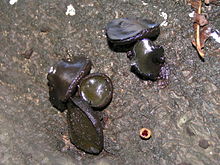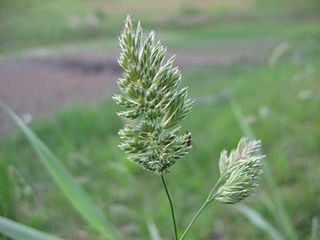| Leotiomycetidae | |
|---|---|
 | |
| Bulgaria inquinans | |
| Scientific classification | |
| Domain: | Eukaryota |
| Kingdom: | Fungi |
| Division: | Ascomycota |
| Class: | Leotiomycetes |
| Subclass: | Leotiomycetidae |
| Orders | |
The Leotiomycetidae are a subclass of the fungal class Leotiomycetes.
| Leotiomycetidae | |
|---|---|
 | |
| Bulgaria inquinans | |
| Scientific classification | |
| Domain: | Eukaryota |
| Kingdom: | Fungi |
| Division: | Ascomycota |
| Class: | Leotiomycetes |
| Subclass: | Leotiomycetidae |
| Orders | |
The Leotiomycetidae are a subclass of the fungal class Leotiomycetes.

Chlorophyta is a taxon of green algae informally called chlorophytes. The name is used in two very different senses, so care is needed to determine the use by a particular author. In older classification systems, it is a highly paraphyletic group of all the green algae within the green plants (Viridiplantae) and thus includes about 7,000 species of mostly aquatic photosynthetic eukaryotic organisms. In newer classifications, it is the sister clade of the streptophytes/charophytes. The clade Streptophyta consists of the Charophyta in which the Embryophyta emerged. In this latter sense the Chlorophyta includes only about 4,300 species. About 90% of all known species live in freshwater. Like the land plants, green algae contain chlorophyll a and chlorophyll b and store food as starch in their plastids.

The Ericales are a large and diverse order of dicotyledons. Species in this order have considerable commercial importance including for tea, persimmon, blueberry, kiwifruit, Brazil nuts, argan, and azalea. The order includes trees, bushes, lianas, and herbaceous plants. Together with ordinary autophytic plants, the Ericales include chlorophyll-deficient mycoheterotrophic plants and carnivorous plants.

Fabales is an order of flowering plants included in the rosid group of the eudicots in the Angiosperm Phylogeny Group II classification system. In the APG II circumscription, this order includes the families Fabaceae or legumes, Quillajaceae, Polygalaceae or milkworts, and Surianaceae. Under the Cronquist system and some other plant classification systems, the order Fabales contains only the family Fabaceae. In the classification system of Dahlgren the Fabales were in the superorder Fabiflorae with three families corresponding to the subfamilies of Fabaceae in APG II. The other families treated in the Fabales by the APG II classification were placed in separate orders by Cronquist, the Polygalaceae within its own order, the Polygalales, and the Quillajaceae and Surianaceae within the Rosales.

The Poales are a large order of flowering plants in the monocotyledons, and includes families of plants such as the grasses, bromeliads, rushes and sedges. Sixteen plant families are currently recognized by botanists to be part of Poales.

Rosales is an order of flowering plants. It is sister to a clade consisting of Fagales and Cucurbitales. It contains about 7,700 species, distributed into about 260 genera. Rosales comprise nine families, the type family being the rose family, Rosaceae. The largest of these families are Rosaceae (90/2500) and Urticaceae (54/2600). The order Rosales is divided into three clades that have never been assigned a taxonomic rank. The basal clade consists of the family Rosaceae; another clade consists of four families, including Rhamnaceae; and the third clade consists of the four urticalean families.
Family is one of the eight major hierarchical taxonomic ranks in Linnaean taxonomy. It is classified between order and genus. A family may be divided into subfamilies, which are intermediate ranks between the ranks of family and genus. The official family names are Latin in origin; however, popular names are often used: for example, walnut trees and hickory trees belong to the family Juglandaceae, but that family is commonly referred to as the "walnut family".

Margrethe II is Queen of Denmark. Having reigned as Denmark's monarch for over 50 years, she is the world's only current queen regnant and the longest-serving current female head of state.
Order is one of the eight major hierarchical taxonomic ranks in Linnaean taxonomy. It is classified between family and class. In biological classification, the order is a taxonomic rank used in the classification of organisms and recognized by the nomenclature codes. An immediately higher rank, superorder, is sometimes added directly above order, with suborder directly beneath order. An order can also be defined as a group of related families.

A surname, family name, or last name is the mostly hereditary portion of one's personal name that indicates one's family. It is typically combined with a given name to form the full name of a person.

Law & Order: Special Victims Unit is an American crime drama television series created by Dick Wolf for NBC. The first spin-off of Law & Order, it starred Christopher Meloni as Detective Elliot Stabler until Meloni left the series in 2011 after 12 seasons, and Mariska Hargitay as Detective Olivia Benson, now the commanding officer of the Special Victims Unit after originally having been Stabler's partner in a fictionalized version of the New York City Police Department. Meloni has since reprised his role as Stabler in the spin-off series Law & Order: Organized Crime (2021–present). Law & Order: Special Victims Unit follows the style of the original Law & Order in that some episodes are loosely based on real crimes that have received media attention.

A personal name, full name, or prosoponym is the set of names by which an individual person is known, and that can be recited as a word-group, with the understanding that, taken together, they all relate to that one individual. In many cultures, the term is synonymous with the birth name or legal name of the individual. In linguistic classification, personal names are studied within a specific onomastic discipline, called anthroponymy.

Proteales is an order of flowering plants consisting of three families. The Proteales have been recognized by almost all taxonomists.

A given name is the part of a personal name that identifies a person, potentially with a middle name as well, and differentiates that person from the other members of a group who have a common surname. The term given name refers to a name usually bestowed at or close to the time of birth, usually by the parents of the newborn. A Christian name is the first name which is given at baptism, in Christian custom.
InterGlobe Aviation Limited, doing business as IndiGo, is an Indian low-cost airline headquartered in Gurgaon, Haryana, India. It is the largest airline in India by passengers carried and fleet size, with a 63.4% domestic market share as of July 2023. It is also the largest individual Asian low-cost carrier in terms of jet fleet size and passengers carried, and the largest carrier in Asia. It carried over 300+ million passengers as of November 2022. It operates 2,000 daily flights, as of December 2023, to 118 destinations – 85 domestic and 33 international. It has its primary hub at Indira Gandhi International Airport, Delhi.

In plant taxonomy, commelinids is a clade of flowering plants within the monocots, distinguished by having cell walls containing ferulic acid.

Caryophyllales is a diverse and heterogeneous order of flowering plants that includes the cacti, carnations, amaranths, ice plants, beets, and many carnivorous plants. Many members are succulent, having fleshy stems or leaves. The betalain pigments are unique in plants of this order and occur in all its families with the exception of Caryophyllaceae and Molluginaceae.

The Amish, formally the Old Order Amish, are a group of traditionalist Anabaptist Christian church fellowships with Swiss German and Alsatian origins. They are closely related to Mennonite churches, a separate Anabaptist denomination. The Amish are known for simple living, plain dress, Christian pacifism, and slowness to adopt many conveniences of modern technology, with a view neither to interrupt family time, nor replace face-to-face conversations whenever possible, and a view to maintain self-sufficiency. The Amish value rural life, manual labor, humility and Gelassenheit.

Spathularia is a genus of fungi in the family Cudoniaceae. Species in the genus are found in coniferous forests around the bases of conifers or near rotting logs. The genus name is Latin for 'broad sword'.

Cudonia is a genus of fungi within the family Cudoniaceae. The genus is widespread in temperate regions and has an unknown edibility.